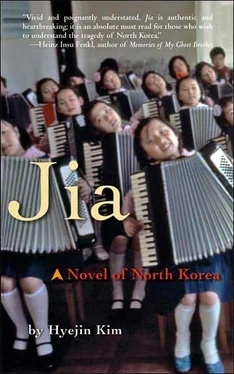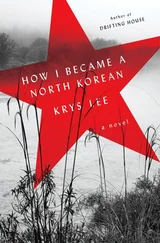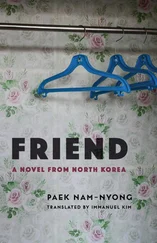He led me to the counter. There were so many square boxes underneath the glass. “Are they all different flavors of ice cream?” I asked in disbelief.
“Yes! Choose two of them.”
In the end, I deliberated for too long and Jin chose for me. Leaving the shop with our ice creams, I felt the wind brush against my face. Feeling ice cream softly melting in my mouth, I looked up at the sky. There were no stars, not even one.
“Can we walk a little bit?” I asked him, looking at the hazy sky.
“Yes, sure. Let’s go to this way.”
I strolled happily along, sometimes bumping into other people gently as I went. I looked at them in panic, but they didn’t care. Nobody cared about me, nobody watched me. I walked and walked, trying to remember everything I saw.
During our second lesson together, I asked my Chinese teacher, Hyunmi, how to get to the Korean-Chinese area from Jin’s house. She told me it was easy to run into kkot-jebi on the streets near the Korean-Chinese center.
“They block people walking on the street and reach out for gifts,” Hyunmi said. “They also congregate around the Korean and Korean-Chinese churches nearby. I always see the same kids after worship on Sunday. Some of my friends are really close to then and always give them money. They call to us, ‘Sisters, brothers, we are all Koreans.’ These words always stop me in my tracks. I hear they sleep together in a private video-viewing room at night. They look so pathetic. None of them has a child’s face anymore.”
I made up my mind to go see them, hoping to find Sangwon. I would ask the children whether they had seen a small boy with a limp. I just couldn’t be happy living on my own like that; I was deeply worried about him. And I knew he was searching just as hard for me.
One day, some two weeks after arriving at Jin’s house, I woke up early and waited for Jin to leave the house. He ate a simple breakfast—two fried eggs and fruit with tea—and departed quickly for his company. I wondered how he’d have energy for the morning with no rice on his plate. He was never comfortable when I woke up early to cook for him, so I would wait in my room until he’d left.
As soon as I heard his car, I called Hyunmi and said I needed to postpone our Chinese study session to the next day because I wasn’t feeling well. Stuffing some paper money and coins in my pocket, I left the house.
The bus slowed as it approached the bus stop but didn’t stop completely. A dark-skinned woman stuck her head out of the window next to the door. Opening the door, she pulled me forcefully by my shirt and lifted me into the bus. I looked at her with surprise, but she didn’t meet my eyes; she just stuck out her open palm. Holding on to the back of a seat, swaying all about, I managed to put a one-yuan coin in her hand; it appeared unnaturally bright against her skin.
The instant I saw Korean words mixed with Chinese on the signs of the stores, I jumped off the bus, which barely slowed down. From the street, I watched it stir up dust as it bounced away into the distance.
I looked around the bus stop so I would know how to get back. There was a giant poster with the yin-yang symbol, advertising Korean Airlines. Across from it was a gray building adorned by a cardboard Korean woman in a hatibok, bowing politely. Finding a wide intersection, I crossed and proceeded straight ahead.
The weather was hot; the wind, thick with dust, felt like cobwebs clogging my throat. I regretted wearing the jeans, as they stuck to my legs. Women rode bicycles in short skirts and men pulled their shirts up to their chests, showing their bare stomachs. I felt embarrassed by them and averted my eyes. Old men waved fans, sitting in the shadows beneath the buildings. I decided to buy the first fan I saw.
As I walked, I looked everywhere for kkot-jebi. I saw people sitting down along the crowded streets, mats and paper spread in front of them. The fortune-tellers’ signs bore the yin-yang symbol with a person’s face in the center. Fortune-tellers sat on each block at about ten-meter intervals. I saw a customer with a serious face, sitting in front of an old man and listening ardently to his predictions.
I couldn’t find a single kkot-jebi on the street. It was growing hotter and more humid, and my body was tiring out. Did I get off at the wrong bus stop? No, I checked several times. A lot of people on the street spoke Korean, but I hadn’t found a church yet. I resolved to go further.
As I was waiting for the light to change, someone gripped my arm tightly from behind. I was startled but turned nimbly to find a man smiling at me. It was one of the men from the karaoke bar.
“Hey, what are you doing here?” he said with a grin. I pretended not to know him and tried to wrest free of his hand. His grip tightened. “Hey, can’t you even say hi to me? Come on! Don’t pretend you don’t know me. I’ve been thinking about you. How have you been?”
He didn’t let go of my arm, but whistled admiringly. “Oh, you don’t look like a beggar anymore. Is the guy who bought you good to you? Look at you! Money is the fastest way to change people, isn’t it?”
I stared at him with annoyance. “Let me go.” People were stepping around us to cross the road.
I tried to wriggle free, but he locked his arm in mine and said, “Let’s go someplace for a cup of coffee. I wanted to be friends, we just didn’t have time. But now look! Don’t you think this is fate? Let’s go, we’ll have some fun after coffee.” He winked.
I pushed him away and stomped on his foot. He screamed and swore, “Fuck, this bitch—” I tried to leap away, but the signal had changed to red, and I had no choice but to jump into traffic.
Chasing after me, he shouted, in Korean, “She’s a North Korean runaway! She took my money! Catch her! “ Then he shouted something in Chinese. All at once, people’s eyes fixed on me, and within seconds, men in uniforms were rushing after me.
I tried to run but bumped into people at every turn. One of the policemen caught me by my hair. He pulled me up to him, and another policeman grabbed my waist. Bystanders formed a circle around us. When I looked back, the man from the karaoke bar was standing in the distance, watching me. Catching my eye, he waved, smiled, and walked away.
I was dragged away by three men, two holding my hands and one pushing my head down hard. I felt pain in my shoulders, but I couldn’t scream. I was taken to a small police station and thrown into an empty prison cell. They called over a young, pink-faced man with pimples who was sitting at a table reading a magazine. He looked at me and asked, in Korean, “Are you North Korean?”
I was silent. He held out his hand. “If you are not, prove it. Give me your ID.”
I replied in English, “I want to make a phone call.”
“I asked you to give me your ID,” he said, in Korean.
I stood up before him and said, “I want to make one call. Someone will come. Until then, I won’t do anything.” I felt it was best not to speak. I had to contact Jin. I crouched down in the corner of the cell and repeated to myself, “I’m not going back there. I’m not going back there.”
He looked at me and inclined his head, then went back to confer with the others. I could understand a bit of what they said—they were debating whether I was really North Korean. They picked up the phone to call someone.
Several minutes later, a female police officer breezed into the cell. She stood me up and investigated my whole body, finding only some Chinese cash—no ID, not even a scrap of paper. I spoke to them in English again and gestured, “Please. I want to make one call. One call.”
After discussing it among themselves, they handed me a phone, and through the bars of the cell I stuck out my index finger to dial Jin’s number. I’ll never forget the endless minute I stood and listened to the number ringing. Jin was never home in the middle of the day, but it was the only telephone number I had. Given another chance, I would call Hyunmi.
Читать дальше












